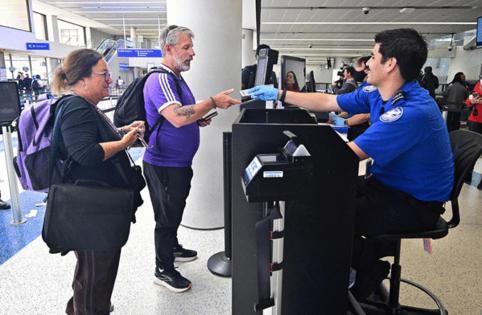Commentary: Immigration procedures should be modeled after TSA PreCheck
Published in Op Eds
The Trump administration is working to secure the borders and deport criminal aliens from the country. So far, the very blunt criteria being used is that anyone who has broken any law, even something as benign as a speeding ticket, may place them at risk of deportation.
Such a chaotic approach is creating anxiety not only amongst undocumented immigrants, but all visa and green card holders, and perhaps even citizens who are watching a cleansing of the nation of what appears to be anyone that the administration deems undesirable.
Given the turmoil surrounding this issue, is there a more principled and orderly way to execute such a process?
The administration need look no further than the Transportation Security Administration (TSA) PreCheck program.
TSA Precheck is a risk-based security program designed to match passenger risk with security resources. To participate, travelers voluntarily provide their fingerprints and subject themselves to a background check. In exchange for this information and vetting, PreCheck-qualified travelers gain access to PreCheck lanes at airports that offer expedited screening, which includes passing through a metal detector rather than a full body screener, leaving their shoes on while being screened, and not having to empty items from their carry-on bag.
Anyone who has been screened in a PreCheck lane at an airport security checkpoint knows how much quicker and more convenient they are than standard screening lanes.
Given that there are several hundreds of thousands of H1-B and J1 visa holders in the nation, many of which provide invaluable expertise for tech industries, universities or healthcare systems, or are part of education or training programs, all such people have already been vetted and documented.
Efforts to deport such individuals are contrary to why they came into the nation, the roles they are filling, and why they received their visa.
The administration is also using activities of documented immigrants to terminate their visa and deport them. This includes support for what is viewed as terrorist activities associated with Hamas, with any such person being labeled antisemitic.
First, it is unclear that support for Palestinian rights equates to a person being antisemitic. Second, being antisemitic may be distasteful to some, but it does not warrant a person being labeled as a criminal.
The PreCheck program offers a well-defined set of criteria that defines eligibility. A similar set of criteria exist for visa holders and immigrants. Given such information, every legal visa holder would be happy to demonstrate that they meet the criteria. This would create more stability around the criteria that warrants deportation.
Of course, it is unclear if the objective of the administration is to define an orderly deportation process. The uncertain and chaotic deportation environment may be an objective of the administration.
The advantage to the administration if this occurs is immense. Locating the estimated 11 million undocumented immigrants is a time consuming, arduous, and expensive process. It would be ideal if the strongarm tactics being used by the administration pushes many to fear apprehension and leave on their own accord. A payout of $1,000 is even being offered to those who self deport. Some may end up doing so. Others will go undercover and become even harder to locate. The existence of sanctuary states like Illinois, California, New York, and Colorado guarantee that locating all such people is impossible.
What the TSA PreCheck program demonstrates is that if you offer a transparent and orderly process for background vetting, with well-defined benefits, it will be embraced with enthusiasm. That is why over 20 million people are now PreCheck qualified. People are willing to give up some personal privacy when there is a clear benefit to be gained by them.
The same can be said about managing the immigrant population in the nation. The administration’s focus on deporting immigrant criminals makes for good sound bites, but a look at the data may surprise some. U.S. born citizens have a higher rate of criminal activity than both documented and undocumented immigrants. The explanation may be as simple as this: Immigrants have a vested interest to stay on the right side of the law to not risk having to leave the country.
Any population that requires vetting is a target for using the TSA PreCheck model. If the administration is serious about deporting criminal undocumented immigrants, the PreCheck model would make the process more efficient, more transparent, and more acceptable. If they wish to continue to create chaos and confusion, they will proceed on their current pathway, fomenting fear and uncertainty for all.
_____
Sheldon H. Jacobson, Ph.D., is a computer science professor in the Grainger College of Engineering at the University of Illinois Urbana-Champaign. A data scientist, he uses his expertise in risk-based analytics to address problems in public policy. He provided the technical foundations for risk-based security that contributed to the design of TSA PreCheck.
_____
©2025 Tribune Content Agency, LLC.

























































Comments